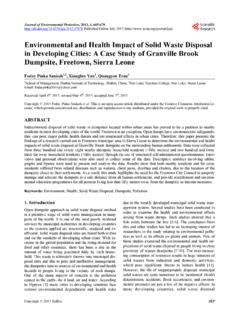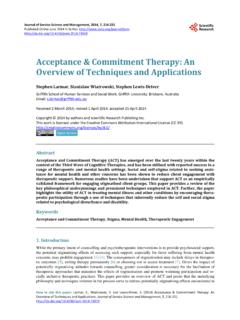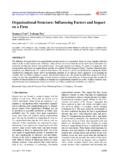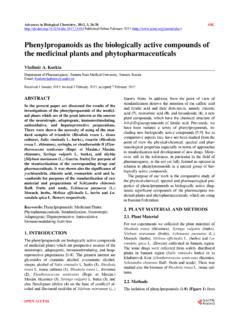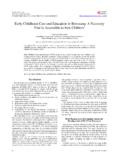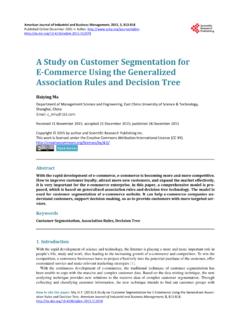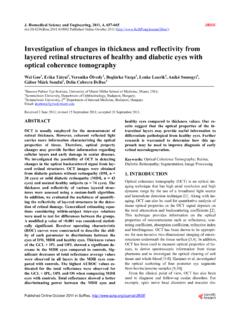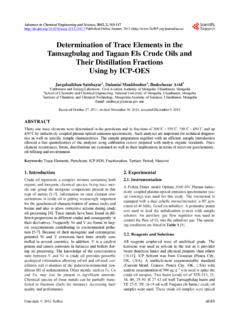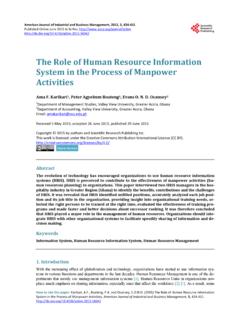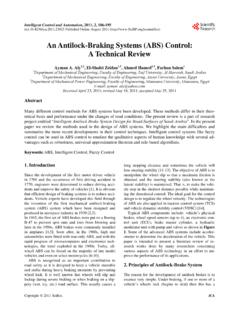Transcription of The Culturally Competent Counselor: Issues Specific to Four
1 Open Journal of Social Sciences, 2017, 5, 113-121. ISSN Online: 2327-5960. ISSN Print: 2327-5952. The Culturally Competent Counselor: Issues Specific to Four Minority Groups Gerald Conner, William Walker Department of Behavioral Science, Faulkner University, Montgomery, AL, USA. How to cite this paper: Conner, G. and Abstract Walker, W. (2017) The Culturally Compe- tent Counselor: Issues Specific to Four Behavioral science helping professionals are ethically obligated to achieve Minority Groups. Open Journal of Social cultural competence in their work with clients. The rapid rise of the minority Sciences, 5, 113-121. population in the United States means that helping professionals can expect to work with clients from cultural backgrounds different from their own.
2 This Received: February 15, 2017 paper examines four cultural groups African Americans, Hispanics, LGBT, Accepted: March 14, 2017 and military veterans, and Specific cultural concerns unique to each group. Published: March 17, 2017. The purpose of the paper is to increase therapist awareness and knowledge of Copyright 2017 by authors and these group- Specific cultural Issues , thereby contributing to a greater degree of Scientific Research Publishing Inc. counselor cultural competence. This work is licensed under the Creative Commons Attribution International License (CC BY ). Keywords Counselor, Cultural Competence, Minority Groups Open Access 1.
3 Introduction Cultural Issues continue to be a major focus in the behavioral science helping professions. The dialogue surrounding these Issues recognizes the importance of helping professionals being Culturally Competent in the delivery of therapy ser- vices. Cultural competence, as it relates to the behavioral sciences, refers to the capacity to draw effectively upon cultural knowledge, awareness, sensitiv- ity, and skillful actions in order to relate appropriately to, and work effectively with, others from different cultural backgrounds [1]. A primary reason and need for the emphasis on cultural competence is the critical relationship between cultural competence and ethical behavior.
4 Ethical standards exist to benefit the client and to prevent harm. Cultural bias and lack of cultural competency on the part of the helping professional work against any intended benefit to the client and may even result in harm [2] [3]. The APA, ACA, and NASW Code of Ethics all acknowledge the significance of cultural DOI: March 17, 2017. G. Conner, W. Walker competence in the delivery of professional services. The ACA Code of Ethics, for example, states that multicultural counseling competency is required across all counseling specialties [4]. Enhancement of therapist competence in the behavioral science field has not always been the case.
5 In times past, the attitude has existed that there was a style of therapy ( , counseling) called regular counseling and a separate, specia- lized skill area called multicultural counseling [5]. The belief was that multi- cultural counseling was an area of specialty, like addictions or career counseling, chosen only by a subgroup of therapists who desired to specialize in this area. The rapid rise of the minority population in the makes it increasingly impossible, if not unethical, for the helping profession to treat multicultural counseling as a specialty area. From 2000 to 2010 racial and ethnic minorities accounted for 92% of the population growth in the United States [6].
6 Helping professionals can no longer choose to limit their practice to one Specific cultural group, nor would it be ethical to do so. In the 21st century, multicultural compe- tence is now a given expectation on the part of all helpers, and rightly so, as mul- ticultural competence is necessary for respecting and understanding the differ- ences that exist in our diverse social structure, society, and worldview [7]. As well, the definition and scope of multicultural counseling competence con- tinue to evolve. No longer limited to Issues of nationality or country of origin, multiculturalism now includes ethnicity, race, gender, age, sexual orientation, religion, socioeconomic status, physical ability, mental ability, geographic re- gion, historical experience, and shared experiences that bind people together [8].
7 Every minority group must deal with cultural Issues inherently unique to that group. As challenging as it may be, helping professionals must possess cultural awareness and knowledge Specific to the uniqueness of each group to provide a level of treatment that meets ethical standards. This paper focuses on a representative cross sample of minority groups based on Pedersen's [8] definition (see above). The sampling includes two minority groups whose identity is based on nationality, African Americans and Hispanics;. one group whose identity is based on sexual orientation LGBT; and one group whose identity is based on shared Specific experiences military veterans.
8 The goal is to enlighten helping professionals to some of the unique cultural-related Issues common to each of these groups, which, in turn, will result in an in- creased overall awareness and understanding of how cultural Issues influence all minority groups. 2. Cultural Competency with African-American Clients There is a long history of disparity of general health services for African-Ameri- cans who represent an underserved vulnerable population in the United States [9]. This disparity is also true of mental health services, as African-Americans are less likely to have access to, seek, and receive mental health treatment [10].
9 To further best practices in cultural competence, helping professionals should be aware that negative cultural experiences have produced certain negative beliefs 114. G. Conner, W. Walker prejudices, especially towards white social service providers [11]. A hesitancy often exists in the willingness to seek mental health services due to a lack of trust of health system providers [12]. Many African-Americans perceive historically marginalized treatment by the mental health system and inadequately trained providers, largely due to a mental health system that has not understood the experiential stressors of the African-American community [13].
10 In addition, while physical illness and health problems are freely discussed, thereby generating needed support from family and friends, mental problems often carry a community stigma [14] [15]. This stigma can result in treatment being delayed or not sought at all [16]. The Culturally Competent helper should be aware that African-Americans are more likely to be misdiagnosed of a mental disorder compared to whites, possi- bly due to the bias of practitioners who apply different diagnostic rules to Afri- can-Americans than they do to white patients [17]. Briggs, et al. [16] make the case that a cultural assessment of African-American clients should be conducted before a clinician assigns a DSM diagnosis.
